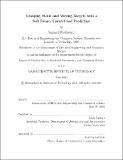Grasping Static and Moving Targets with a Soft Drone: Control and Prediction
Author(s)
Ubellacker, Samuel
DownloadThesis PDF (6.627Mb)
Advisor
Carlone, Luca
Terms of use
Metadata
Show full item recordAbstract
This thesis studies the problem of grasping static and moving targets with a Soft Drone, which is a quadrotor platform where the landing gear is replaced with a soft manipulator. Whereas traditional rigid aerial manipulators are intolerant to positioning errors and susceptible to large contact forces, the Soft Drone leverages a soft, tendon-actuated gripper, whose inherent compliance provides robustness against imprecision and mitigates disturbances. However, the Soft Drone still requires the design of control algorithms for grasping as well as prediction methods to track a moving target.
The first part of the thesis focuses on control algorithms for grasping a static target with specific consideration towards real-world conditions. Unmodeled external disturbances, such as the added mass of the target post-grasp, are estimated and compensated through an adaptive controller. When a motion capture system is not available, the target is localized using purely onboard sensors through a perception-based approach. Experimental results are presented which show that the adaptive control scheme is capable of asymptotically stabilizing the zero tracking error of a static grasp trajectory, despite external disturbances. Initial results of the perception-based grasp are also shown using a photo-realistic simulator.
The second part of the thesis focuses on grasping a moving target. Estimation and prediction of the target’s state become key considerations when the target is moving. We employ an Extended Kalman filter for state estimation and use regularized polynomial fitting to predict the target’s future trajectory. This information is used in a linear model predictive controller, which enables the quadrotor to track the target’s state with minimal error. Simulation results show that our estimation and prediction approaches are robust against varying levels of noise and target predictability and that the control design enables successful grasping of a moving target.
Date issued
2021-06Department
Massachusetts Institute of Technology. Department of Electrical Engineering and Computer SciencePublisher
Massachusetts Institute of Technology